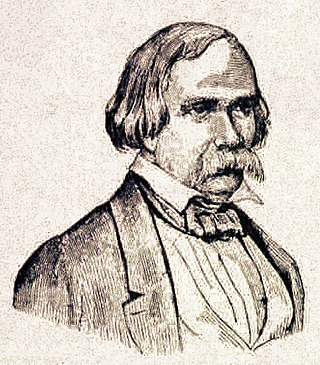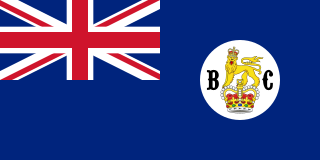
Amor De Cosmos was a Canadian journalist, publisher and politician. He served as the second premier of British Columbia.

The history of British Columbia covers the period from the arrival of Paleo-Indians thousands of years ago to the present day. Prior to European colonization, the lands encompassing present-day British Columbia were inhabited for millennia by a number of First Nations.

John Robson was a Canadian journalist and politician, who served as the ninth premier of British Columbia.

Sir James Douglas was a Canadian fur trader and politician who became the first Governor of the Colony of British Columbia. He is often credited as "The Father of British Columbia". He was instrumental to the resettlement of 35 African Americans fleeing a life of racial persecution in San Francisco who arrived in the province aboard the steamship Commodore in what later became known as the Pioneer Committee. In 1863, Douglas was knighted by Queen Victoria for his services to the Crown.
British Columbia gold rushes were important episodes in the history and settlement of European, Canadian and Chinese peoples in western Canada.

Sir Matthew Baillie Begbie was a British lawyer, politician, and judge. In 1858, Begbie became the first Chief Justice of the Crown Colony of British Columbia in colonial times and in the first decades after British Columbia joined Confederation as a province of Canada.

The Fraser Canyon Gold Rush, began in 1858 after gold was discovered on the Thompson River in British Columbia at its confluence with the Nicoamen River a few miles upstream from the Thompson's confluence with the Fraser River at present-day Lytton. The rush overtook the region around the discovery and was centered on the Fraser Canyon from around Hope and Yale to Pavilion and Fountain, just north of Lillooet.

McGowan's War was a bloodless war that took place in Yale, British Columbia in the fall of 1858. The conflict posed a threat to the newly established British authority on the British Columbia mainland, at the onset of the Fraser Canyon Gold Rush. It was called Ned McGowan's War after one of the conflict's main antagonists.

Frederick Seymour was a colonial administrator. After receiving little education and no inheritance from his father, Seymour was offered a junior appointment in the colonial service by Prince Albert. Seymour held positions in various British colonies from 1842 to 1863, when he returned to England.

The Colony of Vancouver Island, officially known as the Island of Vancouver and its Dependencies, was a Crown colony of British North America from 1849 to 1866, after which it was united with the mainland to form the Colony of British Columbia. The united colony joined Canadian Confederation, thus becoming part of Canada, in 1871. The colony comprised Vancouver Island and the Gulf Islands of the Strait of Georgia.

The Colony of British Columbia was a British Crown Colony that resulted from the amalgamation of the two former colonies, the Colony of Vancouver Island and the mainland Colony of British Columbia. The two former colonies were united in 1866, and the united colony existed until its incorporation into Canadian Confederation in 1871.

The Colony of British Columbia was a crown colony in British North America from 1858 until 1866 that was founded by Richard Clement Moody, who was selected to 'found a second England on the shores of the Pacific', who was Chief Commissioner of Lands and Works for British Columbia and the first Lieutenant-Governor of British Columbia. Prior to the arrival of Moody's Royal Engineers, Columbia Detachment, the Colony's supreme authority was its Governor James Douglas, who was the Governor of the neighbouring colony of Vancouver Island.

Starting with the 1763 Treaty of Paris, New France, of which the colony of Canada was a part, formally became a part of the British Empire. The Royal Proclamation of 1763 enlarged the colony of Canada under the name of the Province of Quebec, which with the Constitutional Act 1791 became known as the Canadas. With the Act of Union 1840, Upper and Lower Canada were joined to become the United Province of Canada.

The British Columbia Provincial Police (BCPP) was the provincial police service of British Columbia, Canada, between 1858 and 1950.

The history of immigration to Canada details the movement of people to modern-day Canada. The modern Canadian legal regime was founded in 1867, but Canada also has legal and cultural continuity with French and British colonies in North America that go back to the 17th century, and during the colonial era, immigration was a major political and economic issue with Britain and France competing to fill their colonies with loyal settlers. Until then, the land that now makes up Canada was inhabited by many distinct Indigenous peoples for thousands of years. Indigenous peoples contributed significantly to the culture and economy of the early European colonies to which was added several waves of European immigration. More recently, the source of migrants to Canada has shifted away from Europe and towards Asia and Africa. Canada's cultural identity has evolved constantly in tandem with changes in immigration patterns.

The Rock Creek Gold Rush was a gold rush in the Boundary Country region of the Colony of British Columbia. The rush was touched off in 1859 when two US soldiers were driven across the border to escape pursuing Indians and chanced on gold only three miles into British territory, on the banks of the Kettle River where it is met by Rock Creek, and both streams turn east to where in times since developed the city of Grand Forks. The first claim was filed by an Adam Beam in 1860, and the rush was on, composed mostly of Americans and some Chinese, all of whom had come overland from other workings, either at Colville or Oregon or all the way from California.
A warden's court is a special court established to deal with disputes relating to mining and mineral tenements. It is presided over by a mining warden. Historically all Australian states had warden's courts, which were established in the late 19th century during the Australian gold rushes. However, in several states the position of mining warden has been abolished or had its powers reduced.
The Queen Charlottes Gold Rush was a gold rush in southern Haida Gwaii of what is now the North Coast of British Columbia, Canada, in 1851.

Sir Henry Pering Pellew Crease was a British-Canadian lawyer, judge, and politician, influential in the colonies of Vancouver Island and British Columbia. He was the first Attorney General of the united Colony of British Columbia, and sat on the Supreme Court of that province for 26 years.
The Columbia Detachment of the Royal Engineers was a contingent of the Royal Engineers of the British Army that was responsible for the foundation of British Columbia as the Colony of British Columbia (1858–66). It was commanded by Colonel Richard Clement Moody, FICE FRGS RIBA, Kt. (France).













